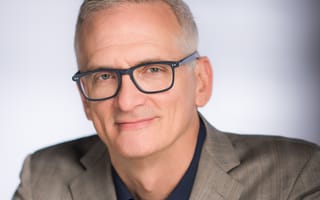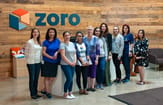
After selling his previous company, Cleversafe, to IBM for more than $1.3 billion two years ago, it didn’t take Chris Gladwin long to re-enter the entrepreneurial fray.
Like Cleversafe, Gladwin’s new startup, Ocient, aims to introduce a new paradigm in how companies manage their data. And to him, there’s no better place to do that than in Chicago.
“The talent engine we built at Cleversafe was the reason we succeeded,” he said. “And a number of things about being in Chicago contributed to that.”
The talent engine we built at Cleversafe was the reason we succeeded.”
One important factor in that equation, said Gladwin, is employee loyalty. Last fall, Business Insider published an article about employee retention at the country’s 10 largest tech companies. Average tenures ranged from 1.2 years at Uber to 2 years at Facebook.
“At Cleversafe, employee longevity was more like 10 years,” said Gladwin. “I have a picture of the team from 10 years before IBM bought the company, and half the people were still there when the acquisition happened. Most of them are still there now.”
Moreover, he said, the quality of available talent is remarkable, thanks to nearby colleges like the University of Illinois Urbana-Champaign, University of Chicago, Illinois Institute of Technology and Northwestern University.
Seen together, these factors helped Cleversafe gain credibility with the large, technologically sophisticated clients it courted. In initial meetings with prospective clients, Gladwin said, it wasn’t uncommon for his company to send an engineer with years of tenure at the company and upward of 100 patents in their area of expertise.
“Then comes our competitor with someone who’s been there for 18 months, who inherited the code from someone else and who is still trying to figure it out,” said Gladwin.
We used to rely on sticking humans into the [data analytics process], but we’re transcending that.”
Big data, big opportunities — but also, big challenges
While exact details of what Ocient does are still under wraps, Gladwin’s new startup aims to help companies take on, and take advantage of, ever-growing volumes of data. As more and more devices amass increasingly granular information, Gladwin said, data sets containing more than a trillion data elements — that is, unique attributes about which data is gathered — will become commonplace.
“There are only a few organizations that analyze data at that scale today, but five years from now it will be the majority,” he said. “If you look at the databases, the data analytics tools and the operating systems — basically all the pieces you need to do that analysis — they’re just not designed for that.”
Nor, for that matter, is the hardware those tools currently run on. And while today’s cutting-edge technologies combine machine learning with selective human intervention, Gladwin said companies are now reaching the point where that strategy won’t work anymore.
“At that scale, data sets become incomprehensibly large,” said Gladwin. “You just can’t sit a human in front of that and expect them to do anything useful. We used to rely on sticking humans into the [data analytics] process to figure out what’s going on, but we’re transcending that.”
Some industries that generate particularly large amounts of data, like finance, adtech and genomic research, are already running into this problem.
Building a new big data paradigm won’t happen overnight. Like with Cleversafe, Gladwin said he won’t be surprised if it takes a decade to reach the end of Ocient’s current product roadmap.
“But we won’t wait that long before we start putting part of it in production,” he said. “The product will mature, and it will be put to use. But that won’t necessarily mean you’ll see any big announcements.”
With a current headcount in the high twenties, Ocient is rapidly growing its team. While Gladwin declined to speculate about how many hires he’d make in the year to come, he said multiple people started on the day of his interview with Built In.
The most important attribute Ocient looks for in prospective hires, said Gladwin, is a genuine passion for what they do.
“The one question we always ask developers is: ‘Of all the software you’ve written, other than things you’ve written for school or work, what’s your favorite and why?’” said Gladwin. “If you’re the type of person who loves to write software, and who does projects because you’re interested or passionate about it, it’s hard to shut you up. If you don’t have that passion, you won’t have an answer.”






